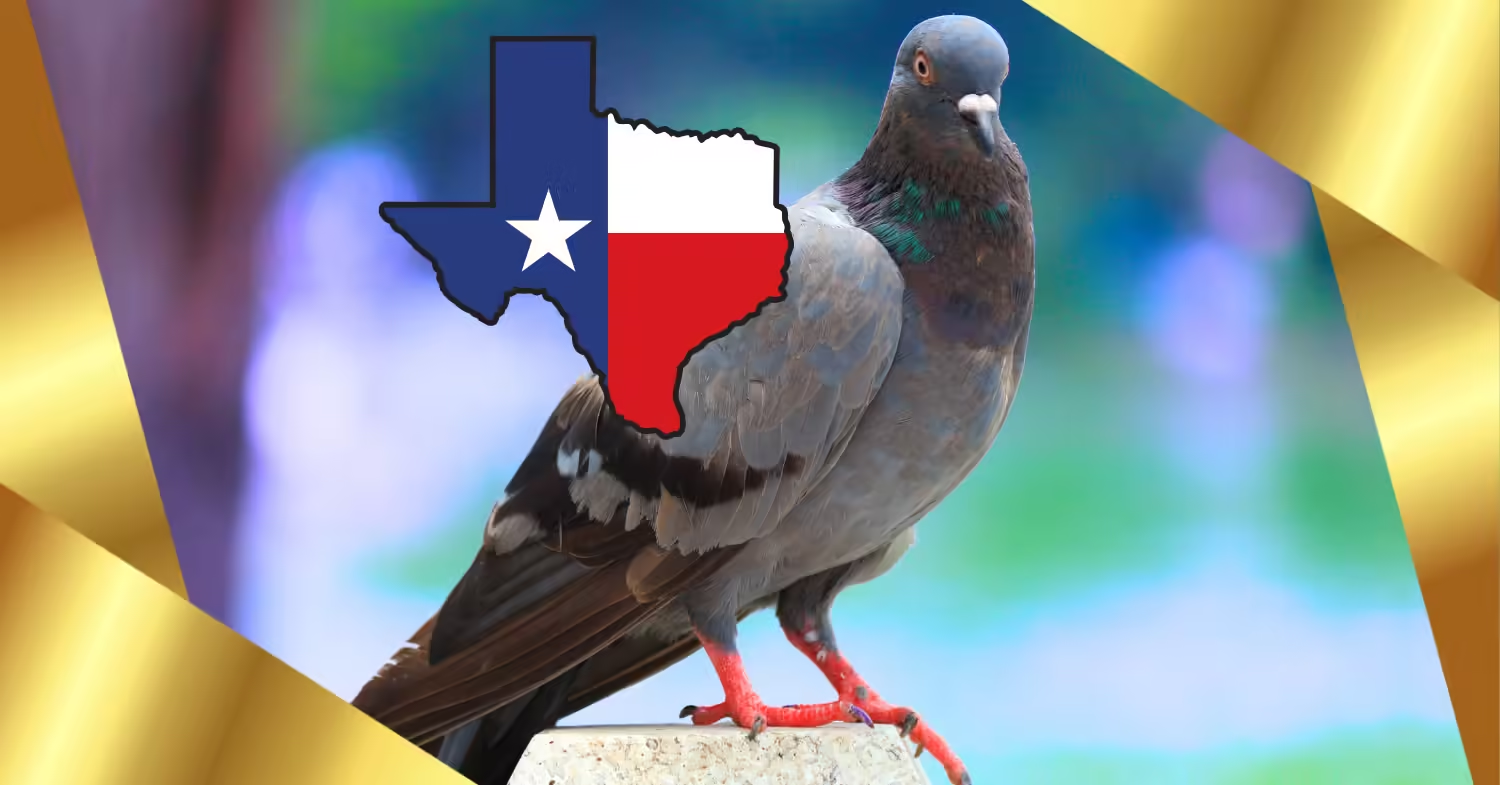Pigeon hunting is a growing activity in Texas, providing hunters with the thrill of challenging fast-flying birds in open fields. For those wondering where to hunt pigeons in Texas, the state is known for its wide-open spaces, diverse wildlife, and favorable hunting conditions, making it one of the best states for this kind of adventure. Whether you’re new to hunting or an experienced marksman, Texas’s vast public lands and private ranches offer something for everyone. In this post, we’ll uncover the 5 best places where to hunt pigeons in Texas, along with essential tips and regulations to ensure a successful trip.
1. Why Hunt Pigeons in Texas?
Hunting pigeons in Texas offers several advantages. For one, the state’s large expanses of rural land make it an ideal environment for hunting birds like pigeons, which are considered pests in many areas. Texas offers a year-round opportunity to hunt pigeons, making it a great activity for those looking to keep their skills sharp outside of traditional hunting seasons. Unlike some game, pigeons don’t require specialized gear or high-end permits, and they provide a challenging target for hunters looking to improve their accuracy.
Pigeon hunting also has practical benefits. Pigeons are quick, agile birds that require hunters to react fast and shoot accurately, providing great practice for those aiming to hunt larger birds or game in the future.
2. The Best Time for Pigeon Hunting in Texas
Texas’s mild climate means that pigeon hunting is possible almost year-round. However, the best time for pigeon hunting is typically during the fall and winter months when pigeon populations tend to be more concentrated. Early mornings and late afternoons are the optimal times of day to find pigeons, as they are more active during these hours while feeding or migrating.
The peak season for migratory pigeons coincides with the fall, adding to the excitement as large groups of birds move across the state. Cooler weather during this period also makes it more comfortable for hunters to spend extended hours outdoors.
3. Where to Hunt Pigeons in Texas: Top 5 Public Lands
Texas is home to several public lands where hunters can pursue pigeons legally. Here are five top spots for public pigeon hunting:
- Black Gap Wildlife Management Area (WMA) – Located in west Texas, this area offers vast open land perfect for hunting pigeons.
- Sam Houston National Forest – Situated in east Texas, this forest offers opportunities for pigeon hunting along with other bird species.
- Matador Wildlife Management Area – With open plains and ample pigeon populations, Matador WMA is a favorite for bird hunters.
- Caddo National Grasslands – Known for its excellent bird habitats, Caddo provides both wooded areas and open spaces ideal for pigeon hunting.
- Guadalupe Delta Wildlife Management Area – Located near the Gulf Coast, this WMA offers diverse wildlife and prime pigeon hunting grounds.
4. Private Ranches: Where to Hunt Pigeons in Texas for a Curated Experience
For hunters looking for a more curated experience, several private hunting ranches in Texas offer controlled pigeon hunts. These ranches often come with guides, shooting ranges, and other amenities, allowing for a more luxurious and focused hunting experience.
Some of the best-known pigeon hunting ranches include:
- Joshua Creek Ranch in the Texas Hill Country, known for its world-class bird hunting experiences.
- Lone Star Pheasant Ranch, offering guided bird hunts, including pigeons, on expansive private land.
These ranches may charge a fee, but they typically offer perks such as guaranteed hunting success, experienced guides, and first-rate accommodations.
Looking for the perfect hunting companion? Discover 5 Proven Techniques for Top Hunting Performance with your Pigeon Labrador and ensure your dog is always ready for the challenge. Learn more here.
5. Texas Hunting Regulations: What You Need to Know
Before heading out to hunt pigeons in Texas, it’s essential to be familiar with the state’s hunting regulations. While pigeons are not classified as game birds, hunters must still adhere to certain legal requirements, including:
- A Texas hunting license is required for all hunters, regardless of the species.
- There are no official bag limits on pigeons, but hunters must follow the ethical guidelines set by local authorities.
- Be sure to check with local wildlife management areas for any specific rules or permits required to hunt on public lands.
Consult the Texas Parks and Wildlife Department (TPWD) for the most up-to-date regulations and to ensure you’re hunting legally and ethically.
6. Gear and Preparation for Pigeon Hunting
Successful pigeon hunting requires the right gear and preparation. Here are a few essentials for your trip:
- Shotgun: A 12 or 20-gauge shotgun with light loads is typically the best choice for pigeon hunting.
- Decoys: Decoys can help attract pigeons by creating the illusion of a safe feeding area.
- Camouflage: Pigeons have sharp eyesight, so wearing camouflage that blends with your surroundings is critical for staying hidden.
- Binoculars: A good pair of binoculars can help you spot pigeon flocks from a distance, allowing you to plan your approach.
In addition, make sure you are prepared with ample ammunition, a hunting blind, and waterproof boots for comfort during long hunting sessions.
7. The Future of Pigeon Hunting in Texas: Conservation and Sustainability
As pigeon hunting grows in popularity, the importance of conservation efforts has also increased. While pigeons are often considered pests, maintaining wildlife balance is key to ensuring sustainable hunting practices. The Texas Parks and Wildlife Department works to monitor pigeon populations and set guidelines that prevent overhunting.
Responsible hunters can also play a role by adhering to ethical hunting practices and supporting conservation programs. By working together, hunters and wildlife organizations can ensure that pigeon hunting remains a sustainable activity for future generations.
8. Tips for a Successful Pigeon Hunt in Texas
Hunting pigeons can be both challenging and rewarding, especially in a large state like Texas where weather and terrain can vary greatly. To have a successful pigeon hunt, consider the following tips:
- Scout the Area in Advance: Pigeons often congregate in agricultural fields, open plains, or near water sources. Visit potential hunting spots a day or two ahead of your trip to identify areas where pigeons are actively feeding or roosting.
- Use Decoys Strategically: Decoys are a great way to attract pigeons to your area. Set up realistic pigeon decoys in feeding positions to lure birds in. Placing them in small groups simulates a safe environment for incoming flocks.
- Stay Well-Camouflaged: Pigeons have excellent vision, so using proper camouflage is crucial to avoid detection. Ensure your clothing and hunting blind blend in with the surrounding landscape. You can also use natural cover, such as bushes or trees, for added concealment.
- Practice Patience: Pigeons are fast-flying birds, and it can take time for flocks to enter your shooting range. Stay patient, and when pigeons arrive, make sure to shoot only when they’re within range to increase your success.
9. Safety Considerations for Pigeon Hunting in Texas
Safety should always be a priority when hunting any game, and pigeon hunting is no exception. Here are a few important safety considerations to keep in mind:
- Proper Firearm Handling: Always practice safe firearm handling. Make sure your gun is on safety until you are ready to fire, and never point your firearm at anything you do not intend to shoot. Be aware of your surroundings, including any fellow hunters.
- Know the Hunting Regulations: It’s essential to stay updated on Texas hunting regulations, which vary depending on the area and the type of land (public or private). Check the rules regarding firearm usage, hunting seasons, and pigeon hunting permits before you head out.
- Wear Protective Gear: Although pigeons aren’t large or aggressive birds, wearing proper eye protection and hearing protection is important when hunting. The loud sounds from shotgun blasts can cause hearing damage over time, so invest in quality ear protection.
- Hydration and First Aid: Texas can have extreme temperatures, especially during peak hunting months. Bring plenty of water and a basic first-aid kit in case of minor injuries. It’s also a good idea to inform someone of your hunting location for safety purposes.
10. Best Strategies for Finding Pigeons on Texas Hunting Grounds
When you’re out hunting pigeons in Texas, employing the right strategies can make all the difference. Here are some proven tactics to help you locate more birds:
- Focus on Agricultural Areas: Pigeons are drawn to areas where they can easily find food, particularly near grain fields and farms. Croplands, especially those with corn, wheat, or sunflowers, are hotspots for pigeons, and farmers often welcome hunters to help control pest populations.
- Locate Water Sources: Pigeons frequently visit water sources, especially during dry months. Ponds, lakes, and streams near open fields make ideal locations to set up for a hunt, as pigeons will often stop to drink before returning to roost.
- Hunt Near Roosting Sites: In addition to feeding areas, pigeons need safe places to roost. Tall trees, barns, or man-made structures are common roosting spots for pigeons. Position yourself near these locations in the late afternoon when pigeons are returning to roost for the night.
- Timing is Key: Pigeons are most active during the early morning and late afternoon hours. Plan your hunting trips around these times to maximize the number of birds you encounter.
Conclusion: Why Texas Is a Prime Destination for Pigeon Hunting
Texas is an ideal state for pigeon hunting, offering vast public lands, private hunting ranches, and favorable hunting regulations. Whether you’re looking for the excitement of hunting on wildlife management areas or prefer the amenities of a private ranch, Texas provides a wide range of opportunities for hunters of all experience levels. With minimal gear requirements and plenty of accessible hunting spots, it’s no wonder Texas is becoming a popular destination for pigeon hunting enthusiasts. Following the state’s regulations and ethical hunting practices ensures a responsible and rewarding experience, whether you’re a seasoned hunter or just starting out.
FAQs About Pigeon Hunting in Texas
- Do I need a license to hunt pigeons in Texas?
- Yes, all hunters must have a valid Texas hunting license, even for non-game species like pigeons.
- When is the best time to hunt pigeons in Texas?
- The best time for pigeon hunting is typically during fall and winter, with early mornings and late afternoons being the most active times for pigeons.
- Are there public lands available for pigeon hunting in Texas?
- Yes, Texas has several public lands such as wildlife management areas and national forests where pigeon hunting is allowed.
- Are there limits on how many pigeons I can hunt in Texas?
- There are no specific bag limits on pigeons, but hunters should always check local regulations before heading out.
- What gear do I need for pigeon hunting?
- Essential gear includes a shotgun, ammunition, decoys, camouflage, and binoculars.
- Can I hunt pigeons on private land in Texas?
- Yes, many private ranches in Texas offer pigeon hunting, often with additional amenities like guides and shooting ranges.
- What are some of the best public lands for pigeon hunting in Texas?
- Top spots include Black Gap WMA, Sam Houston National Forest, and Matador WMA, among others.
- Do I need a guide for pigeon hunting in Texas?
- While it’s not required, hiring a guide can enhance the experience, especially on private ranches.
- What conservation efforts are in place for pigeon hunting?
- Texas Parks and Wildlife Department works on monitoring pigeon populations and ensuring sustainable hunting practices are followed.
- Why is pigeon hunting popular in Texas?
- Texas offers year-round opportunities, large rural areas, and accessible public lands, making it a prime destination for pigeon hunting.

Joseph Bush is a seasoned writer and researcher with over 7 years of experience covering a wide range of general topics, from lifestyle and technology to business and current events. He is dedicated to producing fact-checked, reader-friendly content that informs, engages, and empowers readers.
Throughout his career, Joseph has followed strict editorial guidelines, relied on reputable sources, and ensured every article meets the highest standards of accuracy and clarity. His expertise spans multiple fields, allowing him to explain complex topics in a way that’s easy to understand.
Passionate about continuous learning, Joseph stays updated on industry trends and best practices to deliver trustworthy, well-rounded insights. Readers can rely on his work for its credibility, depth, and real-world relevance.




